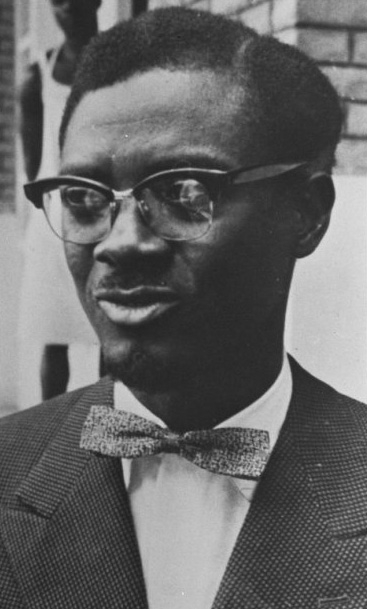
Patrice Lumumba
Patrice Émery Lumumba[e] (/lʊˈmʊmbə/ ;[3] 2 July 1925 – 17 January 1961), born Isaïe Tasumbu Tawosa,[4] was a Congolese politician and independence leader who served as the first prime minister of the Democratic Republic of the Congo (then known as the Republic of the Congo) from June until September 1960, following the May 1960 election. He was the leader of the Congolese National Movement (MNC) from 1958 until his execution in January 1961. Ideologically an African nationalist and pan-Africanist, he played a significant role in the transformation of the Congo from a colony of Belgium into an independent republic.
"Lumumba" redirects here. For other uses, see Lumumba (disambiguation).
Patrice Lumumba
Office established
Himself
Office established
17 January 1961 (aged 35)
near Élisabethville, State of Katanga[d]
- François Lumumba
- Guy-Patrice Lumumba
- Roland-Gilbert Lumumba[1]
- Juliana Lumumba[1]
- Marie-Christine Lumumba[1]
Shortly after Congolese independence in June 1960, a mutiny broke out in the army, marking the beginning of the Congo Crisis. After a coup, Lumumba attempted to escape to Stanleyville to join his supporters who had established a new anti-Mobutu state called the Free Republic of the Congo. Lumumba was captured en route by state authorities under Joseph-Désiré Mobutu, sent to the State of Katanga and, with the help of Belgian partisans, executed by the separatist Katangan authorities of Moïse Tshombe. He was seen as a martyr for the pan-African movement. In 2002, Belgium formally apologised for its role in the execution.
Political ideology[edit]
Lumumba did not espouse a comprehensive political or economic platform.[199] According to Patricia Goff, Lumumba was the first Congolese to articulate a narrative of the Congo that contradicted traditional Belgian views of colonisation, and he highlighted the suffering of the indigenous population under European rule. Goff writes that Lumumba was alone among his contemporaries in encompassing all Congolese people in his narrative (the others confined their discussions to their respective ethnicities or regions),[200] and he offered a basis for national identity that was predicated upon having survived colonial victimisation, as well as the people's innate dignity, humanity, strength, and unity.[201] Lumumba's ideal of humanism included the values of egalitarianism, social justice, liberty, and the recognition of fundamental rights. He viewed the state as a positive advocate for the public welfare and its intervention in Congolese society necessary to ensure equality, justice, and social harmony.[202]